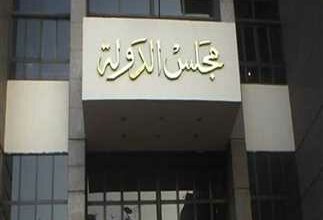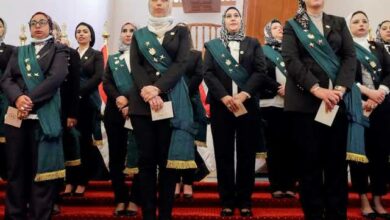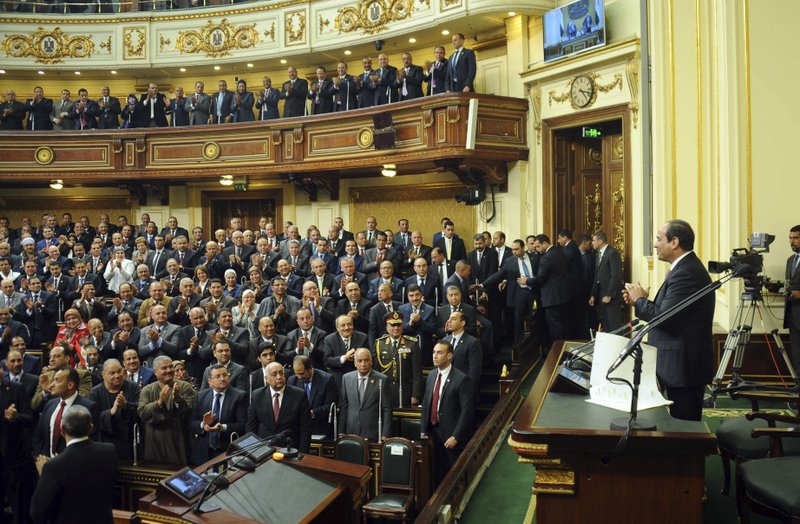
Chants of “down with the regime” echoed Saturday through the halls of the Judges Club, whose general assembly rejected President Mohamed Morsy’s recent constitutional declaration and called on all courts to suspend their work in protest. Nearby, a judicial group called Judges for Egypt announced its support for Morsy’s decisions, with the two groups taking jabs at each other. Morsy’s controversial declaration exempts his decrees from judicial oversight, and protects the Constituent Assembly and the Shura Council, the upper house of Parliament, from dissolution by court order. The president also fired the prosecutor general, an act that goes beyond the conventional powers the president has, and appointed a new one. The recent showdown has made it clear that the judiciary is a political arena of its own — even though it may seem apolitical.
Guilty
Today, the most vigorous opposition Morsy faces comes from within the judiciary, specifically the Judges Club, which is controlled by figures known for their ties to former President Hosni Mubarak’s regime.
The current head of the Judges Club, Ahmed al-Zend, is known as one of the judicial figures who collaborated with the Mubarak regime. After the judicial independence current won control over the Judges Club in 2001, Zend won the presidency of the club in 2009, and again in 2012 — bringing Mubarak’s supporters back into the club.
Zend has taken an aggressive stand against the current regime since its election. Following a session in the now-dissolved Islamist-dominated Parliament, in which MPs criticized the court ruling in the case of Mubarak last July, Zend went on an elaborate rant against Parliament, saying the judges would not have supervised the elections had they known it would result in this parliamentary makeup, and that the judges refused to abide by any laws it enacts.
On Saturday, a fiery meeting took place in the Judges Club, led by Zend, and former regime supporters within the judiciary, who were deemed the strongest tool Mubarak had against the independence of the judiciary movement and a strong pillar for his regime’s survival.
Nasser Amin, head of the Arab Center for the Independence of the Judiciary and the Legal Profession, says the same judges who helped Mubarak suppress the movement for judiciary independence are fighting Morsy’s decisions in the Judges Club.
“The group leading the Judges Club is as far as can be from the movement seeking the independence of the judiciary. In fact, they stood vigorously and with a lot of might with Mubarak against the independence of the judiciary,” Amin says.
Amin adds that while their current position against Morsy’s declaration is ostensibly siding with the independence of the judiciary, they are doing it for other reasons.
“Their current position does not originate from support for the independence of the judiciary. They are moving in the framework of a continuing struggle between them and the enemies of the past,” says Amin, referring to the judicial independence current, which the group had long fought under Mubarak.
The meeting resulted in a list of decisions that included a general call for a strike in all courts until the annulment of Morsy’s declaration.
Amin explains that even though the judges who now control it have little credibility, the Judges Club is still the most influential group for the majority of judges, who are neutral and don’t belong to any political current.
“The judges by nature don’t like to be in a specific current or join in any fuss, but with the size of the attack that they endured in the recent period, even the conservative judges had to revolt and defend themselves,” says Amin.
Meanwhile, although the recommendations of the Judges Club are not binding, and despite the Supreme Judicial Council urging judges not to join the strike, many judges and prosecutors all over the country have abided by the club’s decision and suspended work in their courts.
Abiding by the club’s decision, the general assembly of the Court of Cassation said Wednesday that it will suspend work in all courts until the annulment of the constitutional declaration.
With a different background and enduring commitment to the independence of the judiciary, some members of the current carrying the same name equally expressed their criticism of Morsy’s declaration.
The independence current started its struggle in the late 1980s, facing state persecution that compelled many judges to flee the country. In 2001 and 2002, the group won the presidency and the board of the Judges Club, a broad union for judges traditionally dominated by regime-affiliated figures, thus allowing it to lead a fierce battle for the independence of the judiciary in 2005.
That same year, the pro-Mubarak Supreme Judicial Council pressured judges to oversee elections with no guarantees of their independence. It waged a media war against a political current advocating independence of the judiciary, calling judges a minority, and subjected many of the movement leaders to disciplinary boards.
The Judges Club led a movement of judges who threatened to refrain from overseeing the parliamentary elections scheduled for the end of 2005 unless legislative amendments were adopted to ensure that violations that judges observed would be acted upon.
After the judges were eventually pressured to oversee the elections without getting guarantees that they could freely report violations, Mubarak went after the leaders of the independence current. Mahmoud Mekky, who is now vice president, and Judge Hesham al-Bastawisi — both leading advocates of judicial independence — were referred to a disciplinary board for publicly criticizing the judiciary after they spoke of electoral violations in the media.
Following a sit-in by the judges and solidarity from political movements and activists, the two judges were acquitted. The crisis shed brought public attention to the battle and earned its judges public support and respect.
Now, Morsy has promoted many of these judges into the Justice Ministry. They include Justice Minister Ahmed Mekky, Vice President Mahmoud Mekky, Judicial Inspection head Zaghloul al-Balshy, in addition to many of the justice minister’s aides and other government positions.
Moreover, Hossam al-Gheriany, former head of the Supreme Judicial Council, is the head of the Islamist-dominated Constituent Assembly, charged with writing the constitution.
Balshy is one of those who is against Morsy’s declaration.
“We don’t change our principles. We are and will always remain against the infringement of the independence of the judiciary, whether we are in or out of the government,” said Balshy, insisting that the current still plays the same role that it played under Mubarak.
The independence of the judiciary current issued a statement rejecting Morsy’s declaration, even though some of the current’s members are part of the decision-making circuit responsible for it.
Not guilty
Other figures in the independence of the judiciary current have stayed silent with regard to the declaration, along with other members from the current within the government.
Groups that have endorsed Morsy’s move include Judges for Egypt, which justified its support in a statement saying that the elected president had the right to take all exceptional measures necessary to ensure the country’s stability.
The public first became aware of this group when it came out before the official announcement of the 2012 presidential election results announcing that Morsy had won, in anticipation of vote rigging.
Since then, the group has consistently supported all of Morsy’s decisions. While many think the group is affiliated with the independence current, Balshy denies this, saying they only represent themselves.
Amin says it has become increasingly clear that the new group is affiliated with the Muslim Brotherhood, and that it currently has a very small number of judges after many left it because of its unconditional support for the Brotherhood.
“Judges were turned off from the group when they found that it was about judges for the Muslim Brotherhood and not for Egypt,” says Amin.
In general, Amin says, the members of the independence current in Morsy’s government have disappointed and shocked those who expected them to bring their ideals into the government.
“Morsy’s regime rubbed off on them and completely paralyzed their will, and made them just like any other member in the government. They were not able to pass even one idea or decision that promotes the independence of the judiciary in Egypt,” says Amin.
But Balshy defends his current’s position.
“The positions of our current are unquestionable, and the history of each judge regarding the independence of the judiciary is known,” he says. “It is known who was and still is for the independence of the judiciary and who isn’t.”
Well…
Two senior judicial authorities have remained ambiguous towards the constitutional declaration in the war of statements, while the third took on some negotiations initiatives with Morsy.
The Supreme Constitutional Court is one of them.
Two major standoffs mark the growing rift between Morsy and the SCC. In June, Morsy initially said he would not swear his oath before the court, but reversed his decision and then later backtracked on a decision to reinstate Parliament after it was dissolved by a court order.
Morsy’s declaration is now seen as particularly aimed at protecting the Constituent Assembly and the Shura Council, in anticipation of a SCC ruling dismantling them.
While addressing a crowd of supporters Friday defending his constitutional declaration, Morsy insinuated that the SCC is forging verdicts when he claimed that its ruling in the case against the Shura Council, set to be announced on 2 December, was leaked weeks before the verdict session.
The SCC issued a statement rejecting the claim, saying it had never compromised its independence.
“The court refrains from commenting or expressing its opinion about it because it is connected to the nature of the court’s work, and potential related cases could be viewed in the court,” the SCC declared in a statement.
While the statement that it would refrain from commenting on Morsy’s declaration, the presence of one of the court judges — Tahani al-Gebali, a Mubarak appointee — in the Judges Club meeting Saturday was a reminder of anti-Brotherhood bias within the court.
Similarly, the State Council, which has jurisdiction over administrative disputes, also refrained from commenting, deeming itself a party to the dispute because there were several cases filed in the council against Morsy’s declaration. A ruling from it is expected on 4 December.
Amin says that while the court does not hold biases, it is by nature prone to disagreements with Islamic currents.
“The court is the source of civil jurisprudence in the Egyptian judiciary, which opposes the idea of the expansion of political Islam and is the most significant hurdle in the face of Islamic jurisprudence that the Muslim Brotherhood wants to apply,” says Amin.
He adds that the animosity between the Islamist current and the SCC started long before Morsy’s presidency, and is showcased by an attempt to submit the SCC structure to an Islamist-dominated Parliament while it was still working.
Meanwhile, the Supreme Judicial Council, the highest body that regulates the work of the courts, has adopted a moderate position on the current crisis, demanding Morsy issue amendments to the declaration, while holding negotiations with him and rejecting calls for a judicial strike.
Amin says the Supreme Judicial Council is more reluctant to voice its opinion because of its role as an unbiased representative of the judiciary, explaining its lukewarm position toward the declaration, neither supporting nor strongly denouncing it.
However, he says, the council was able to find ways to side with Mubarak’s regime, an indication that political bias is still a factor in its decisions.
This piece appears in Egypt Independent's weekly print edition.




